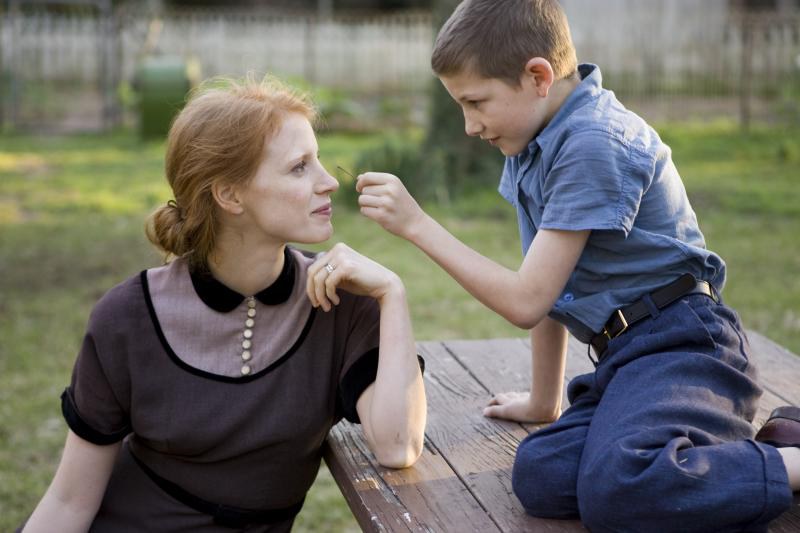The Tree of Life

In the first moments of Terrance Malick’s new film, The Tree of Life, we are presented with two competing and supposedly alternate approaches to facing life and its beauties and hardships. There is nature, and there is grace. Nature is difficult and tries to find the worst in the world, Grace is generous and tries to find the best. I think this is disingenuous, and that the truth lies in the middle. Nature gives and takes, it doesn’t try to find the worst, but it doesn’t look for the best either. Rather, it is indifferent. Grace wishes to find the best and forgive the worst, but sometimes ignores the reality.
Sean Penn is Jack O’Brian, a middle aged man, eldest son of Brad Pitt and Jessica Chastain. Early on, we see the moment when Mrs. O’Brian (Chastain) receives word that her middle son has died. She phones her husband and gives him the horrible news. This is all done in fragmented, voice over, internal moments, so the narrative is somewhat broken and confusing. You actually never find out how or why the son died. The how and why are immaterial; it is the fact of his death that is important, that throws the parents, and Penn, into a tailspin, when the world seems to spin and reel around them.

After the second son’s death, the film goes back to the history of the universe, with shots of the cosmos, of space and planets and nebulae after nebulae. My first attempts at trying to figure out what this might mean surrendered to the simple enjoyment of beautiful cinematography. Gorgeous, gorgeous film. From the cosmos, to splitting cells, to dinosaurs, some of whom seem to understand the concept of compassion. Nature and Grace, together. We come forward through history, and back to the O’Brian family. This sequence, to me, was sort of a scream into space…like the mother, crying out in pain, “Why? Why would You go to all of this trouble, to create the universe, to create the planets and the stars, the seas and the trees and the animals, why would you do everything that leads up to this moment, to my son being born and living his childhood, and then dying at the age of 19. Why?”
This questioning seeps through the story…it is not so much a seeking a greater meaning in God or in nature, as it is seeking some meaning and hope in a marriage of the two. In the vast scheme of things, perhaps the events of one small life do not matter. But they matter dearly to the lives they are affecting.
Most of the story is told through the eyes of Jack, the younger Jack, played with so much feeling by Hunter McCracken. And Malick does an amazing job of showing childhood in the 50s, of a singular time in our history. Jack’s parents, Mr. and Mrs. O’Brian (Brad Pitt and Jessica Chastain), are trying their best to raise their children. He is a strict disciplinarian, who brings the frustrations of the oppression in his work life home, and it comes out in his parenting of his three boys. He loves his sons dearly, he is affectionate, but they are afraid of him. She is sweet and playful, and in just her company, the children come out of their shells and seem to open up to the world. But she is perhaps too permissive, and there are hints that the children might take advantage of her slack discipline. In so many ways, he is nature, and she is grace.
The ambition of the film seems to be, to show us the meaning of life. I’m not sure that I understood it, or more than the human parts, the pain and joy of having babies and watching them grow. The pictures and music are amazing, and deserve much praise and awards. I think I’d like to see it again, on the big screen, and try to figure it out.
(Ted and I did another ‘he said/she said’ review…you can read his review, here)
3 Comments
Ted
I liked your review! I thought you captured themes that I missed (i.e., Nature vs Grace), and how the parents reflected those archetypes in the film.
Dad Who Writes
I really, really want to see this! If I ever get a night off.
Schadenfreude Warehouse
Movies? In a theater? Who can remember? I’ve got to get out more!